We have stumbled on the article relating to Dealing with Low Water Pressure in Your Home directly below on the web and thought it made good sense to share it with you in this article.

Low tide stress in your home can be an aggravating issue, affecting everything from bathing to washing dishes. If you're experiencing weak water circulation, there are numerous possible causes and options to check out. In this overview, we'll go over usual factors for low water pressure and functional steps to resolve the problem successfully.
Intro to Low Tide Pressure
Low water stress occurs when the flow of water from your faucets, showers, and other fixtures is weak than common. This can make day-to-day jobs more challenging and much less efficient. Understanding the causes of low water pressure is crucial to finding the right option.
Usual Causes of Low Water Stress
Faulty Stress Regulators
Pressure regulators are in charge of keeping regular water pressure in your house. If they malfunction, it can result in low tide pressure or unequal circulation throughout your house.
Local Water Supply Issues
Often, the issue exists outside your home. Local water supply problems, such as main line leaks or upkeep job, can momentarily reduce water pressure in your location.
Pipeline Obstructions
With time, pipes can become obstructed with natural resource, debris, or debris, limiting the circulation of water. This is a common issue in older homes with galvanized steel pipelines.
Corrosion
Corrosion within pipelines can lead to leaks and reduced water stress. Rust buildup can tighten water circulation, particularly in maturing plumbing systems.
Just How to Diagnose Low Tide Pressure
Examining Pipelines
Evaluate noticeable pipes for signs of leaks, rust, or blockages. Focus on any unusual noises, such as banging or rattling pipelines, which could suggest concerns within the plumbing system.
Consulting with a Plumber
If you're incapable to determine the root cause of low water pressure, consider employing a specialist plumber to conduct a thorough evaluation. They can determine underlying concerns and suggest ideal services.
Checking Taps and Components
Begin by checking the water stress at different taps and fixtures throughout your home. If the problem is separated to particular areas, it may suggest local troubles.
Do It Yourself Solutions to Take Care Of Low Tide Stress
Flushing Hot Water Heater
Sediment build-up in the hot water heater can restrict flow and reduce performance. Purging the tank regularly aids get rid of debris and maintain optimum efficiency.
Examining Pressure Regulator
Make sure that the pressure regulatory authority is functioning properly. Changing or replacing the regulator can help restore appropriate water pressure throughout your home.
Cleaning Aerators and Showerheads
Natural resources can gather in aerators and showerheads, minimizing water circulation. Eliminate and clean these components consistently to enhance water pressure.
Clearing Up Clogs in Piping
For minor clogs, try utilizing a plumbing snake or chemical drainpipe cleaner to clear obstructions in pipes. Beware when utilizing chemicals and comply with safety and security guidelines.
When to Call a Specialist Plumber
If DIY initiatives stop working to fix the problem or if you think considerable plumbing troubles, it's ideal to look for assistance from a qualified plumber. They have the knowledge and tools to attend to complex problems safely and properly.
Preventive Measures to Preserve Water Pressure
Setting Up a Pressure Booster
Consider mounting a stress booster pump to enhance water pressure in locations with consistently low flow. This can be particularly beneficial for multi-story homes or properties with high-demand components.
Monitoring Water Usage
Be mindful of water use habits and prevent overtaxing the plumbing system. Basic changes, such as incredible showers and washing tons, can aid keep adequate water pressure.
Normal Upkeep
Arrange routine upkeep for your plumbing system to avoid issues such as deterioration, leaks, and clogs. Attending to small issues early can assist prevent more substantial repair work later.
Verdict
Managing low water stress can be irritating, yet recognizing the underlying causes and executing appropriate remedies can recover optimal flow throughout your home. Whether it's cleaning up aerators, inspecting pipes, or speaking with a plumber, taking positive actions can make certain a steady supply of water for your everyday requirements.
FOUR WAYS TO FIX LOW WATER PRESSURE NOW
Turning on a shower or faucet only to find the water comes out in a sad, slow drizzle is never a good feeling. How exactly are you supposed to wash a pan or take a quick shower when it takes 10 minutes just to rinse off a little soap? The good news is that when your water pressure is bad, there's always a cause: typically one that can be easily fixed. Here are some of the most common causes of low pressure and what you can do to fix the issue:
DEBRIS AND MINERAL DEPOSIT BUILDUPS
If you notice low water pressure from just one or two of the fixtures in your house, the problem likely has to do with debris buildup. Water is full of minerals and other debris, all of which can accumulate in your pipes and on your fixtures. This can cause a blockage that affects how much water flows through. To fix this, try filling a small plastic bag with white vinegar, and use a rubber band to hang it around your showerhead or faucet. Let the head of the fixture soak for a few hours, and the vinegar should loosen the deposits.
WATER LEAKS
Leaks are another common cause of low water pressure. If water is flowing out of your plumbing through a hole or crack before it can reach your fixture, the pressure coming out of the faucet or showerhead will be lower. A plumbing professional is your best bet for finding and repairing a leak in your water supply pipes.
Leaks are another common cause of low water pressure. If water is flowing out of your plumbing through a hole or crack before it can reach your fixture, the pressure coming out of the faucet or showerhead will be lower. A plumbing professional is your best bet for finding and repairing a leak in your water supply pipes.
A VALVE ISSUE
If you have low water pressure throughout your home, check your main shut-off valve to make sure it's completely open. You may also want to see if there's a pressure-reducing valve installed. If there is, have a plumber help you adjust the settings to get the pressure you're looking for.
OTHERS USING WATER
Believe it or not, your low water pressure could be caused by your neighbors. If you notice low pressure at certain times of day, it may be because you and the people living next to you have similar schedules - when everyone is showering at the same time, the pressure will be lower in every home. Low pressure throughout the neighborhood may also be caused by an issue with your municipal water supply. If that's the case, call the supplier to see if they're working on the issue.
https://www.rotorooter.com/blog/water-leaking/low-water-pressure-fixes/

We were made aware of that article on 9 Reasons for Low Water Pressure in Your House through someone on our other domain. Sharing is nice. Helping people is fun. Thank-you for taking the time to read it.
Book